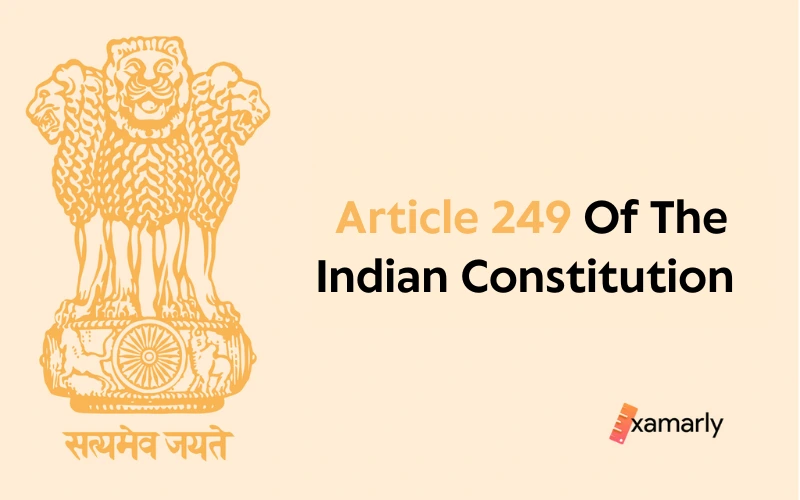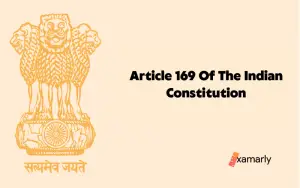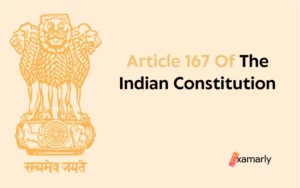An Overview
We know by now that the Parliament enjoys more authority than the Legislatures of States in several aspects.
Article 249 of the Indian Constitution is yet another article that grants agency to the Parliament for the purpose of making laws. Do you wish to know the motive behind the making of such laws? Does the question arise in your mind how does the Parliament turn a resolution into a law?
This detailed blog on Article 249 explores in details the provisions of this article and also tries to explain it. To get an answer to these questions and to educate yourself about Article 249 of the Indian Constitution, continue reading till the end.
- An Overview
- What Is Article 249 Of The Indian Constitution All About?
- Summing Up
- FAQs Related To Article 249 Of The Indian Constitution
- Which Chapter Of The Constitution Of India Does Article 249 Of The Indian Constitution Fall Under?
- What Is The Other Name For Council Of States?
- What Special Power Does Article 249 Of The Indian Constitution Render To The Rajya Sabha?
- What Was The Modification Done To Clause (1) Of Article 249 Of The Indian Constitution?
- What Is Article 246A Of The Indian Constitution All About?
- How Many Clauses Are There In Article 249 Of The Indian Constitution?
- What Is The Type of Majority Needed As Per Clause (1) Of Article 249 Of The Indian Constitution For The Passing Of A Resolution?
- What Are The Different Types Of Majorities For The Purpose Of Parliamentary Legislation?
What Is Article 249 Of The Indian Constitution All About?
Article 249 contains provisions with respect to the authority that the Parliament has, to make laws for the issues mentioned in the State List. These laws are related to concerning matters as they are in the interest of the entire nation.
This article is composed of three clauses, namely- clause (1), clause (2), and clause (3). Let us now take a look at the clauses of this article closely and try to determine its meaning one at a time. These clauses have been directly quoted from the official text of the Constitution of India.
(1) Notwithstanding anything in the foregoing provisions of this Chapter, if the Council of States has declared by resolution supported by not less than two-thirds of the members present and voting that it is necessary or expedient in the national interest that Parliament should make laws with respect to [goods and services tax provided under article 246A or] any matter enumerated in the State List specified in the resolution, it shall be lawful for Parliament to make laws for the whole or any part of the territory of India with respect to that matter while the resolution remains in force.
The introductory clause, that is, clause (1) of Article 249 states that the provision provided in the previous articles of this Chapter does not have any influence on this particular clause.
It adds that if a resolution has been passed by the Council of States, or the Rajya Sabha and the said resolution has been supported by at least two-thirds of its members or more that were present and voting, then the Council of States can declare that such a resolution is extremely crucial and necessary for the Parliament to make laws for the entire country or any part of the Indian territory with respect to those issues that need addressing. These are the matters that are mentioned in the State List and in the said resolution as well, keeping in mind the interest of the whole nation.
An insertion in the clause suggests that these laws are related to the taxes levied on goods and services. Article 246A of the Indian Constitution mentions this provision.
This provision allows for the Parliament to legislate on matters that are normally within the purview of the state governments, if the Rajya Sabha deems it necessary in the national interest. The resolution passed by the Rajya Sabha remains in force until it is specifically repealed by the Council.
(2) A resolution passed under clause (1) shall remain in force for such period not exceeding one year as may be specified therein: Provided that, if and so often as a resolution approving the continuance in force of any such resolution is passed in the manner provided in clause (1), such resolution shall continue in force for a further period of one year from the date on which under this clause it would otherwise have ceased to be in force.
The next clause of Article 249 tells us that if a resolution has been issued under clause (1), then it must stay in effect for a duration not exceeding one year as defined in the clause.
It further explains that if and so frequently as a resolution authorising the continuation of any such resolution is made in the manner specified in clause (1), then such a resolution shall remain in effect for a year further from the date on which, under this clause it would otherwise have ceased to be in force.
(3) A law made by Parliament which Parliament would not but for the passing of a resolution under clause (1) have been competent to make shall, to the extent of the incompetency, cease to have effect on the expiration of a period of six months after the resolution has ceased to be in force, except as respects things done or omitted to be done before the expiration of the said period.
The final clause of this article informs us that if a legislation that has been passed by Parliament, that in a normal situation the Parliament would not have been competent to enact but just for the passage of a resolution under clause (1) must pass, to the extent of the incompetency.
The formulated law shall cease to have effect upon the expiry of a period of six months after the validity of the resolution has reached its limit. However, this provision does not apply to certain things. It is not applicable to things that were done or omitted to be done before the expiration of the said period.
Summing Up
- In summary, Article 249 of the Indian Constitution contains the provisions for allotting power to the Parliament of India to make laws in respect of the issues that find a mention in the State List.
- The provisions of clause (1) of this article states that the Council of States, or the Rajya Sabha may pass a resolution that requires a special majority in approval of the concerned resolution to be turned into a law. This special majority is defined as two-third majority or more than that of the total members present and voting.
- This resolution can stay in effect for a year. Another resolution passed in the support of the previous resolution can stay in force for a year after the date of expiration of the previous resolution.
- Lastly, a law introduced through such a resolution has an expiry period of six months after the validity of the resolution expires. The provision remains ineffective for things done or removed before the defined expiry date.
FAQs Related To Article 249 Of The Indian Constitution
Which Chapter Of The Constitution Of India Does Article 249 Of The Indian Constitution Fall Under?
Article 249 of the Indian Constitution falls under Chapter I of Part XI of the Constitution of India. Chapter I is on Legislative Relations and it deals with the Distribution of Legislative Powers. Part XI of the Constitution of India is titled ‘Relations Between The Unions And States’
What Is The Other Name For Council Of States?
The Council of States is also known as Rajya Sabha. It is the Upper House of the bicameral Parliament of our country.
What Special Power Does Article 249 Of The Indian Constitution Render To The Rajya Sabha?
Under the provisions of Article 249 of the Indian Constitution, the Rajya Sabha, or the Council of States has the authority rendered upon it to transfer a matter that needs addressing from the State List to the Union List. However, it can only do so for a specified period of time.
What Was The Modification Done To Clause (1) Of Article 249 Of The Indian Constitution?
A specific portion of clause (1) was inserted into the original clause by Section 4. This section of the added the words “goods and services tax provided under article 246A or” to the initial clause. It took effect from September 16, 2016.
What Is Article 246A Of The Indian Constitution All About?
Article 246A of the Indian Constitution provides that the Parliament and the Legislature of every State have the authority bestowed upon them in context of framing laws related to the goods and services tax which is imposed upon either by the Union or by such State.
An important point to be noted here is that the Legislature of the State must make use of this power subject to clause (2). Also, this provision held as Article 246A is applicable despite whatever provisions are mentioned in Article 246 of the Indian Constitution and Article 254 of the Indian Constitution.
How Many Clauses Are There In Article 249 Of The Indian Constitution?
Article 249 of the Indian Constitution is constituted by three clauses. These are clause (1), clause (2), and clause (3).
What Is The Type of Majority Needed As Per Clause (1) Of Article 249 Of The Indian Constitution For The Passing Of A Resolution?
As per the provision of clause (1) of Article 249 of the Indian Constitution, for a resolution to be passed by the Council of States, or the Rajya Sabha, a minimum of two-thirds of its members need to be present and voting to facilitate the Parliament to design laws for such matters that are specifically mentioned in the State List.
Therefore, clause (1) of Article 249 of the Indian Constitution shows special majority.
What Are The Different Types Of Majorities For The Purpose Of Parliamentary Legislation?
For the purpose of Parliamentary legislation, the different types of majority that exist are Absolute majority, Effective majority, Simple majority, and Special Majority.






